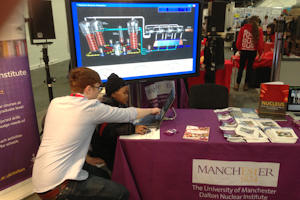Passing on the spark of inspiration to tomorrow's nuclear scientists
22 May 2014
Dalton Nuclear Institute has recently submitted a final report to EPSRC cataloguing the outcomes and main achievements of a key outreach/public engagement initiative.

During the course of the ‘So You Think You Know About Nuclear Energy’ funded programme (May 2010 to November 2013), the Institute has engaged with over 15,000 at events attended by over 108,000 people, distributing educational materials across the globe to teachers, museums and even prison inmates!
They’ve played a part in inspiring the next generation of nuclear scientists and engineers at events such as The Big Bang Fair (in London and Birmingham) and Smallpeice Trust Summer School at the University, helping to enthuse school children in STEM-related topics and hopefully at the same time contributing towards helping meet the nuclear industry skills challenge.
An article on these outreach activities has appeared in the Nuclear Industry Association’s publication:
- IndustryLink: Autumn 2013 (see page 5/32 ‘Helping the Public Get to Grips with Nuclear Science and Engineering’)
As part of its Nuclear Industrial Strategy, the Government sees the Public Understanding of Nuclear Energy as a key focus, and following on from this EPSRC-funded public initiative, the Institute is continuing to play a key role in this important national initiative.
Grant holder Professor Andrew Sherry said: “Public engagement is an important area of focus for the University and for the Dalton Nuclear Institute. Although overall public acceptance of nuclear energy has been rising, there is an acknowledgement within government and industry that more needs to be done to enhance the acceptability of nuclear energy as part of the UK's low carbon energy mix.
“We are working with government, industry and other stakeholders to establish a new strategy for public engagement built on the principles of clarity, trust, dialogue and consultation. We are also working at the sharp end, creating and using new tools for schools, teachers and the wider public that help start a dialogue about nuclear energy and how it can help meet the country’s low carbon electricity needs.”
